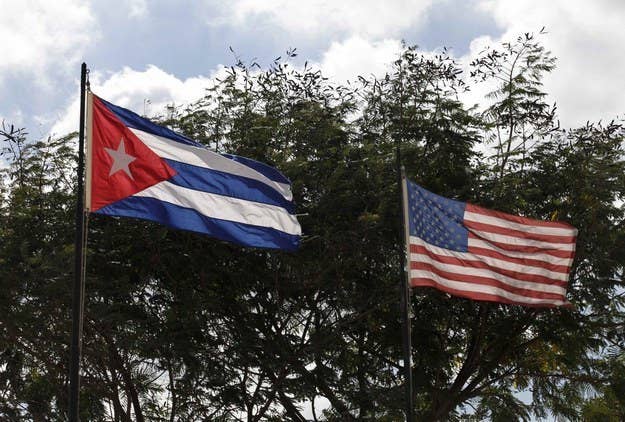
Updated with comment from a State Department spokesperson
WASHINGTON — The families of the "Brothers to the Rescue" activists whose planes were shot down in 1996 by the Cuban military were not warned that the United States was going to release the spies who had been part of a ring that infiltrated the group, the sister of one of the victims said on Tuesday.
Ana Ciereszko, the sister of one of the four men who died, said Tuesday that the families feel "misled" by the State Department.
Her brother was killed during a mission as part of the Brothers to the Rescue (Hermanos al Rescate) group, a Miami-based Cuban exile group that once flew over the Straits of Florida providing assistance to people rafting from Cuba to Florida and sometimes entering Cuban airspace to drop fliers. In 1996, the Cuban military shot down two Brothers to the Rescue planes, killing the four pilots aboard: Ciereszko's brother Armando Alejandre, Mario de la Peña, Pablo Morales, and Carlos Costa.
It was determined that Brothers to the Rescue had been infiltrated by the Cuban Five, five Cuban spies who were part of the Wasp Network of Cuban intelligence agents in the United States. Cuban Five member Gerardo Hernandez was convicted of conspiracy to commit murder because of the role he played in the Brothers to the Rescue shootdown.
Now, Hernandez and two of his fellow spies have been released from prison following the exchange for Alan Gross, an American aid worker imprisoned in Cuba, and a second prisoner, a U.S. spy who had been in Cuban detention for 20 years. The U.S. government has also announced sweeping changes in its policy towards Cuba. It even facilitated the insemination of Hernandez's wife with his sperm while he was in prison.
Ciereszko said she and the other Brothers to the Rescue families were blindsided by all the news — especially since, she said, they had not been notified about the release.
"The United States government did not reach out to us, I found out on the morning news shows," Ciereszko said. There was "no warning."
"We feel very misled by the U.S. government," Ciereszko said.
She said that the families had always focused on Hernandez, who was the only one of the spies to be charged with conspiracy to commit murder for the Brothers to the Rescue case.
"We only discussed Gerardo Hernandez because the other men were convicted of spying on the United States, but not in the conspiracy of murder of our relatives," she said.
Ciereszko said she had brought up the issue of what was going to happen to the spies during meetings with U.S. government officials twice in the past year and a half, once in July 2013 and once in November of this year. "We feared that that exchange would happen," she said.
She said in November she had met with Mark Wells, the State Department official in charge of Cuban affairs, other State Department officials, and a Department of Justice official, and that the officials had told her that any decisions would be made at a "different level" — for example, not at the State Department. A State Department spokesperson confirmed the meeting and said that they had discussed "a range of issues relating to Cuba including democracy and human rights."
"We understand many people across the country feel very strongly about our Cuba policy," the State Department spokesperson said. "And when we hear from people across the political spectrum, their main focus is on the Cuban people and how we can do more to support them. This is exactly what our new policy will do. Our policy goals have not been accomplished through decades of the previous policy – and we've only been left with less influence in Cuba. This new policy will both help the Cuban people - everyone's overriding goal – while giving the United States more influence."
Ciereszko also criticized the U.S. government for making it possible for Hernandez's wife to get pregnant.
"Carlos, Mario, and Pablo were never able to have children," she said. "They were between 24 and 29 years old when they were killed and they never were given the opportunity of life and never given the opportunity to have a child. It doesn't seem fair."
She said the families are still seeking some kind of punishment for the Cuban pilots and general who were charged with the murder of the four men in 2003.
"Our next step is to get together in January, the families, and decide where to go from here," Ciereszko said. "We don't plan to just quit seeking justice in this case. We lost too much to now say, 'Oh well, too bad.'"
